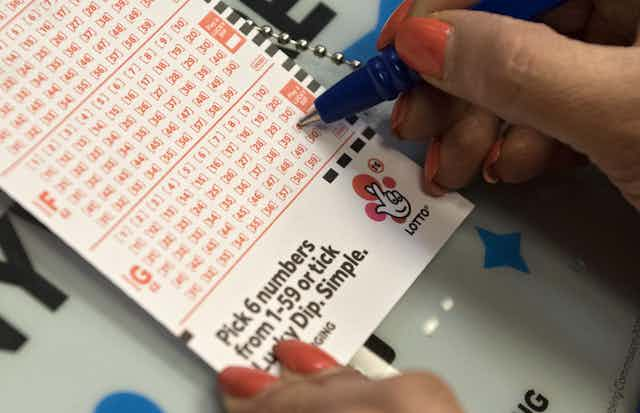The UK’s National Lottery recently added more balls to its Lotto machines, meaning that the chances of winning the jackpot are smaller. Has this ruined the fun? Do the lower odds mean that the vast majority of weeks are likely to go by without a big winner, just as we recently saw with 14 consecutive rollovers?
Working out your chance of winning the Lotto jackpot is not difficult. Let’s start with the old rules. You need to match all of the first six balls drawn out of the machine. There are 49 numbers to choose from, and you have six of these on your ticket. Therefore, when the first ball is drawn, you have a six in 49 chance that it matches one of yours. Cross that one off.
There are now 48 balls left in the machine, and five numbers on your ticket. So when the second ball rattles to the bottom of the chute, there is a five in 48 chance that it matches one of yours. If you match the first two then, for the third ball, you have a four in 47 chance; for the fourth, three in 46; for the fifth, two in 45; and if you match all of the first five, then the final ball has a one in 44 chance of matching the last number left on your ticket.
Crunching the numbers
Multiply 6/49 by 5/48 by 4/47 by 3/46 by 2/45 by 1/44 and we have our answer: the chance of winning the jackpot with a single ticket under the old rules was 0.000000071511, or almost exactly one in 14m.
Under the new rules not much has changed, there are just 59 balls instead of 49. We can do the same calculation but replace 49 with 59, 48 with 58, and so on. This tells us that the probability of winning the jackpot under the new rules is 0.000000022194, or about one in 45m.
Clearly one in 45m is much less likely than one in 14m. But these probabilities are so small that it’s hard to get a feel for what they mean. Perhaps it’s easier to imagine how long it would take before you can reasonably expect to win, if you enter one ticket each draw: with two draws a week, under the old system you’d have to wait 134,000 years. Under the new system it’s 432,000 years. Quite a while, either way.
Alternatively, we can ask which is bigger: the probability of winning the Lotto jackpot on a single ticket, or the chance of dying this year by being struck by lightning? It turns out that, under the old rules, the two are pretty similar. Under the new rules, you’re about as likely to win the Lotto as you are to die by lightning strike just in July this year.

So will we see multiple rollovers on a regular basis? We are told that 32m people regularly play the National Lottery. What we don’t know is how many tickets for the main Lotto draw are sold each week, but let’s assume it’s somewhere around 15m.
If everyone used the “lucky dip” function to choose their numbers randomly, that would mean the chances of a rollover on any given draw are about seven in ten. So we can expect to see a jackpot winner about once in every three draws. The chance of seven rollovers in a row is then about 10%, and the chance of 14 rollovers in a row –- which is what caused the massive jackpot on January 9 –- is about 1%, a once-a-year event.
What we can say, then, is that 14-time rollovers will not become the norm under the new system, though they will happen once a year or so. Under the old system we would have been waiting a thousand years for a similar event. And that is the point of the changes. More rollovers mean bigger prizes, and bigger prizes mean more publicity and more sales.
Still worth it?
So should you stop playing the Lotto in protest that winning the jackpot has become much harder? From a mathematics point of view, if you are only in it to win it, the best advice has always been not to play at all, even before the rule changes.
If you do play, you’re best off trying to pick numbers that are less likely to be chosen by someone else because this increases your chances of winning the whole jackpot, rather than sharing it. This means you should choose high numbers (above 31 because lots of people use birthdays) and avoid patterns like picking one number from each row. And play only when there are rollovers to maximise your expected returns.
On the other hand, if you find it fun to have a flutter, or if you are happy that a chunk of your money will go to good causes, then don’t let the maths stop you. Just bear in mind that you won’t win the jackpot. I can guarantee it. Well, almost.

